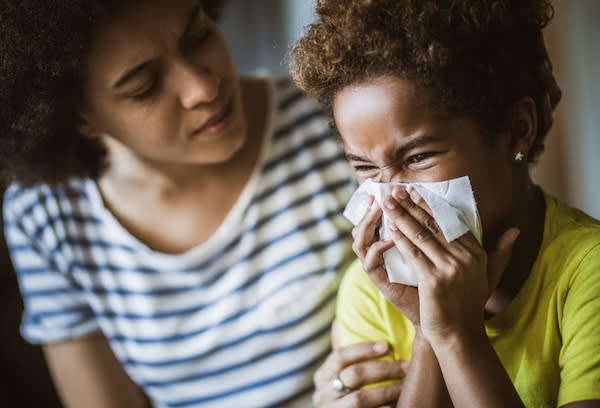Does your child have a cold, or is it seasonal allergies?

[3 MIN READ]
In this article:
- A cold is a viral illness that can cause a runny or stuffy nose, a fever and a sore throat.
- Seasonal allergies, or “hay fever,” occur when your body reacts poorly to certain substances.
- One of the best ways to tell the difference between a cold and allergies is by seeing whether the symptoms go away after one to two weeks. If they do, it’s probably a cold.
How many people do you know who attribute their sniffly nose to allergies? Do you ever wonder whether they truly have allergies, or if they’re just sick? It can be hard to distinguish between a common cold and allergies — especially if it’s your child who’s suffering, and you’re trying to figure out how to relieve their symptoms.
“I always get questions about this from my patients,” says Elizabeth Meade, M.D., a pediatrician and medical director of quality for pediatrics at Providence Swedish.
Here, we explain some of the main symptoms of both a cold and allergies, and how you can tell the difference.
What is the common cold?
A cold is an illness that affects your nose and throat. You can “catch” a cold through viruses that spread from person to person — usually through airborne contact, such as someone sneezing on or near you.
Common cold symptoms and treatments
The most common cold symptoms include:
- Cough
- Nasal congestion
- Low-grade fever
- Feeling unwell
- Runny or stuffy nose
- Sore throat
- Sneezing
Although colds can certainly make your child miserable, they are usually harmless and go away within two weeks. There’s no cure, but you can treat it by allowing your child plenty of rest, encouraging them to drink fluids and giving them over-the-counter cold medicine, if needed.
What are allergies?
Allergies occur when your immune system reacts to a certain substance, such as pollen, dust mites, pet dander, an insect sting or a specific type of food. Some types of allergies can be life-threatening, but for the purposes of this article, we’ll be discussing only seasonal allergies, often referred to as “hay fever” or allergic rhinitis. These types of allergies can be bothersome, but usually aren’t life-threatening.
Allergy symptoms and treatments
The most common symptoms of hay fever include:
- Itching of the eyes, nose or roof of the mouth
- Runny or stuffy nose
- Sneezing
- Watery or red eyes
Your child is more likely to develop hay fever if you or a close relative also have seasonal allergies. The best way to treat your child’s allergies is by avoiding the substance that is causing the reaction, but that’s often impossible when the act of simply walking outside can trigger an allergic reaction.
Your pediatrician or an allergist can prescribe medications to relieve your child’s symptoms, such as oral medications, nasal sprays or eye drops.
What’s the difference between a cold and allergies?
According to Dr. Meade, one of the key symptoms to watch out for is whether your child has a fever. “If they do, this is very unlikely to be allergies,” she says. “It really is likely to be a viral infection.”
On the other hand, if one of your child’s symptoms is itchy, watery eyes, there’s a very good chance they’re suffering from allergies, because a viral infection doesn’t cause itchy eyes.
Dr. Meade also suggests that you take a look at the timeline of symptoms. “If your child has had the same symptoms for more than a couple of weeks, and they’re not getting worse, but the symptoms are just there and not changing, that’s much more likely to be allergies than a viral infection,” she says.
Another idea is to keep track of your child’s symptoms over the long term. If, for example, they experience the same symptoms every April, it’s very likely they have seasonal allergies.
“If you ever have questions,” Dr. Meade says, “or you're not sure if you should go to work or send your child to school, it's always worth a conversation with your health care provider to make sure that you're not missing an infection.”
Contributing caregiver

Elizabeth Meade, M.D., is a pediatrician and medical director of quality for pediatrics at Providence Swedish.
Find a doctor
If you are looking for a Providence pediatrician or health care provider, you can search for one who’s right for you in our provider directory.
Download the Providence app
It’s all in the app: easily stay connected with Providence and your health. With the Providence app, you can schedule appointments, have virtual visits from the comfort of your own home, get health recommendations personalized for you, access your health records and so much more. Learn more and download the app.
Related resources
Hunker down at home with a cold or flu
Kids’ respiratory illnesses 101
This information is not intended as a substitute for professional medical care. Always follow your health care professional’s instructions.



